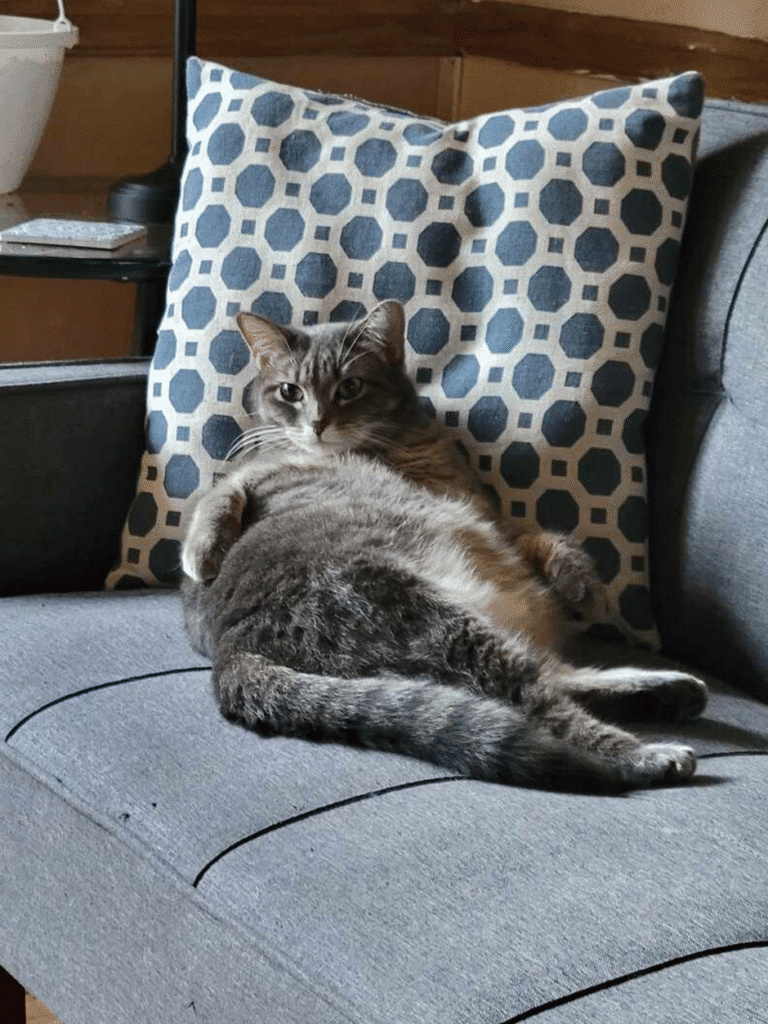My name is Jasper, and I am the true owner of this apartment. Clara is my primary provider, and for three perfect years, our life was a predictable, quiet symphony of routines: 7:00 AM breakfast, 5:30 PM lap time, and total, uninterrupted control of the sunny patch by the window.
Then came Leo.
From my perspective—low to the ground, attuned to energy fields and scent profiles—Leo was an intrusion. He was loud, he smelled faintly of turpentine and cheap take-out, and he had an aggressive tendency to pet me incorrectly (too fast, too rough).
Clara had optimistically called it a “temporary arrangement.” Three months later, Leo was still inhabiting the spare room, paying no rent, and worse, throwing the entire delicate balance of the home into chaos.

I observed their interactions. Clara, my soft, predictable human, had begun to move with a strange, taut energy. She would stand in the kitchen, staring at the empty coffee canister—the expensive, whole-bean kind that we enjoyed—and her face would get that crumpled look of suppressed fury. Leo, meanwhile, was a large, unmoving obstacle. He would sprawl on the sofa, sometimes for an entire day, consuming space and air, and demanding that I share the sunniest spots on the rug. I refused on principle.
The food situation became critical. My food bowls were kept separate, but the tension over human sustenance was palpable. Clara started hiding her special snacks—fancy cheese and cured meats—in containers behind the vegetable crisper. Leo, the apex freeloader, discovered this within days.

One afternoon, I watched from my perch on the kitchen counter. Clara had bought two small, perfectly packaged salmon fillets for her dinner. I love salmon, even the human version, so I paid close attention. She left them in the fridge and went to the gym.
Leo entered the kitchen thirty minutes later, humming a song. He opened the fridge, spotted the fish, and without a second thought, unwrapped one fillet, cooked it, and ate it, leaving the discarded plastic and a single, offensive crumb on the edge of the counter.
When Clara returned, I greeted her with a low, mournful mrrrow—my best impression of an alarm siren—and led her straight to the counter. When she saw the single remaining fillet, her body went rigid.
She turned to see Leo, sprawled on her sofa, scrolling his phone, and looking utterly satisfied. He smiled, offered a casual, “Oh, hey, those were great!” and Clara’s face cycled through anger, resignation, and finally, a painful, forced politeness. She simply said, “Good,” and walked away to eat toast in her room.

This was the pattern: Leo took, Clara swallowed the cost. I registered the shift in her scent—a sharp, sour note of anxiety and resentment that made my own tail twitch in frustration. My perfect, peaceful routine was polluted by his smell of entitlement.
The emotional climate was toxic. I stopped sleeping on the sofa and relocated my naps to the back of the closet, where at least the air was clean and unbothered by Leo’s endless stream of philosophical ramblings.
Clara, the clever financial analyst, started writing things down. She’d sit at her desk, tapping her pen, compiling what I now refer to as the Book of Grievances. She wrote and rewrote a note, trying to find the perfect combination of firmness and kindness that would somehow make Leo pay or leave without a fight.
She finally crumpled the note in frustration. I watched it arc across the room, a white flag of surrender thrown into the corner. You have to use your words, human, I thought, but all I could do was rub against her leg and purr the sound of reassurance.
The confrontation came, not over money, but over a lightbulb. It was an expensive, custom bulb that Leo had left burning for days on end, until it finally sputtered and died, leaving the kitchen in an inconvenient gloom. When Clara saw the cost of the replacement online, a wave of cold, hard resolve finally washed over her.

When she cornered Leo in the living room, I knew it was the moment. Leo’s face, usually so loose and easy, tightened into a mask of wounded pride.
“This is business, Leo,” Clara said, and her voice sounded different—strong, not shaky.
Leo fought back with words: “You’re being so aggressive! I thought we were friends!”
I did my part. As Leo started to argue about “the stifling capitalist system,” I slowly, deliberately, walked over to his backpack—the one he left on the floor near the door—and began to methodically scratch the expensive leather. It was a quiet, relentless sound that served as a low-frequency hum of disapproval beneath their argument. He is wrong, human. Make him leave.
The scratching worked. Or maybe Clara’s sudden, uncharacteristic firmness did. Leo was cornered. He agreed to move out in two weeks.

The final days were pure, distilled awkwardness. Leo moved around the apartment with exaggerated sighs and the dramatic clattering of boxes, making sure Clara—and I—knew how unjustly persecuted he was. I maintained a safe, high-ground surveillance position on the bookshelf, observing him like a specimen under glass.
On the last morning, I was sitting by the front door when I heard the unmistakable scrape of his luggage being dragged out. He didn’t say goodbye to Clara, and he certainly didn’t say goodbye to me.
The door clicked shut. The sound echoed in the sudden, deep silence.
Clara emerged from her room an hour later. She looked pale, exhausted, but lighter. She walked into the living room, took a deep breath, and actually smiled.
I hopped down from the bookshelf. The anxiety scent was gone. The smell of cheap paint thinner and indifference was gone. The apartment smelled only of clean air, old wood, and her familiar lavender laundry detergent.

She walked to the kitchen, opened the treat canister (a 10:00 AM snack! A deviation in routine, but a welcome one!), and gave me two salmon-flavored crunchies.
Then, she sat on the couch, the one she had been avoiding, and patted the cushion next to her.
I jumped up, curled into a tight, perfect circle on her lap, and began to purr. It was the deepest, most resonant purr of the last six months. The tension was gone, the freeloader was evicted, and the natural order of the universe had been restored. The apartment was once again a sanctuary, and the rightful owner was finally comfortable.


